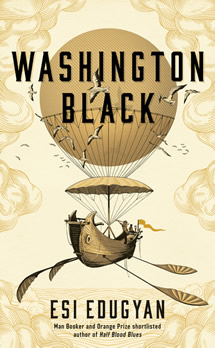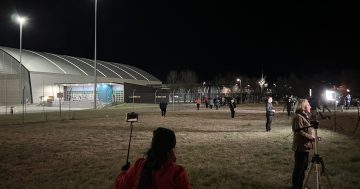Reviewed by Robert Goodman.
By Esi Edugyan, Allen and Unwin.
 Washington Black is the second book for Esi Edugyan to be shortlisted for the Booker Prize. It mixes brutal realism and social commentary with a quixotic fantasy with steampunk trimmings that takes its protagonist across the globe.
Washington Black is the second book for Esi Edugyan to be shortlisted for the Booker Prize. It mixes brutal realism and social commentary with a quixotic fantasy with steampunk trimmings that takes its protagonist across the globe.
Washington Black is a young slave on a Barbados sugar plantation called Faith in 1830. The reader finds out that he is soon to be free but the sting is in the journey that gets him there and the way he is treated once he attains that status. Life on Faith is hard and becomes harder when the plantation owner dies and the running is taken over by the violent Erasmus Wilde, a man who sees the slave population as inhuman and expendable. Erasmus arrives with his brother Christopher, a dreamer and scientists who is building a flying machine that he calls the Cloud Cutter. Christopher, aka Titch, asks for and is given the young Black as a servant and goes to work making his dreams a reality. When the brothers learn that their father has died, Titch flees with Black in tow beginning a years-long odyssey. Black’s journeying takes him to Virginia, the arctic where he is abandoned by Titch, Newfoundland, England, Holland and Morocco along the away making allies and encountering setbacks.
Washington Black is a book about belonging and identity. Black, born a slave, has a hard time dealing with the concept of freedom. He searches for Titch despite the fact that the man, no matter how hard he tried not to, treated him like property. He finds that a bounty hunter still haunts him even though slavery has been abolished and he is supposedly free. Despite Black’s inherent skills as an illustrator and inventor in his own right, he finds that he gets no respect for his ideas or his work as a black man in the mid-nineteenth century. But Black does find belonging, a woman who loves him and supports him in his work and helps him to move beyond the circumstances of his birth.
The narrative rambles from one location to another, sometimes because Black is running from something and later because he is searching for something. Edugyan’s descriptions of the sugar plantations drip with humidity in stark distinction from the section of the book set in the frozen wastes of the arctic. But while Washington Black is full of movement and encounter, Edugyan’s diverse environments only emphasise that the effects of slavery and inherent racism are difficult to outrun.
This and over 300 more reviews can be found at www.pilebythebed.com.











